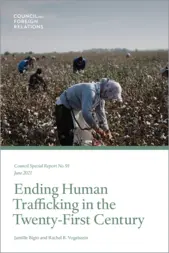Human Trafficking
About the Project
Despite near universal condemnation of human trafficking, the number of victims remains high, with an estimated 40 million people trafficked and enslaved worldwide—71 percent of whom are women and girls. The scale of the problem is only growing, exacerbated by global challenges including migration and conflict. Today, human trafficking bankrolls operations for transnational crime syndicates and extremist groups, producing an estimated $32 billion annually for perpetrators, making it one of the world’s most profitable crimes. New tools are needed to improve implementation of global and national anti-trafficking standards. The financial sector has an important role to play in freezing profits illegally gained by traffickers; private industry could do more to ensure that supply chains are slavery free; and national security policies should address how human trafficking fuels conflict, drives displacement, and undercuts the ability of international institutions to promote stability.
To improve global and U.S. efforts to eliminate modern slavery, the Project on Human Trafficking will propose innovative and robust enforcement initiatives, thereby adding critical tools to the arsenal of human rights-based and prosecutorial approaches that have produced too little progress to date. Project activities will include a Council Special Report, short publications, a symposium, and roundtable series.
Events
-
Human trafficking bolsters abusive regimes and criminal groups, weakens global supply chains, fuels corruption, and undermines good governance. Jamille Bigio and Rachel B. Vogelstein urge the United States to increase investment in anti-trafficking measures.
-
-
-
Human trafficking can fuel conflict, drive displacement, and undercut the ability of international institutions to promote stability. The United States should work to disrupt and dismantle the criminal networks and terrorist groups that exploit conflict-related human trafficking, while prioritizing the prevention and prosecution of and protection from human trafficking in conflict contexts.
More from this Program
Project
Project
 Online Store
Online Store

